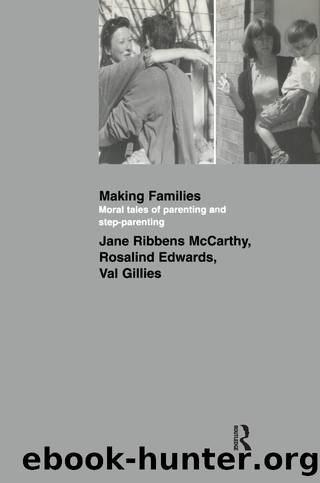Making Families by unknow

Author:unknow
Language: eng
Format: epub
Tags: Social Science, Sociology, General
ISBN: 9781134282050
Google: -Kg0DwAAQBAJ
Barnesnoble:
Goodreads: 38365135
Publisher: Sociologypress
Published: 2003-04-01T00:00:00+00:00
Caring: blood is thicker than water
The importance of biology in defining a parent's emotional involvement with a child appeared to be an exclusively middle-class concern amongst our sample. From this perspective, the genetic tie between a parent and child generates a more intense and enduring emotional connection, in comparison to step-relationships. Absolute commitment and loyalty are associated with biological parent-child relations, with biological parents portrayed as naturally more protective of their own children. For example, Lyn (White, middle class, mother and resident step-mother) made a clear distinction between parenting her biological children and 'taking on board' step-children:
There is no doubt that there is a big difference between your natural children and other children that you take on board. It's just something that, you know, your own children there's such an incredibly close tie. You know, you feel with them for everything. And it's not the same for other children. I think you grow to love other children. I'm sure you do. I would say I'm very fond of Ellie and Max. But I do think had they been two very difficult children, maybe it would never have worked.
For Lyn, step-parenting reveals the difference between caring for and caring about children. As primary caretaker, she accepts responsibility for meeting Ellie's and Max's physical and emotional needs, but while she stresses her fondness for them, she can not equate this with how she feels about her own children:
I know that I'm different to Ellie and Max than if they were my real children ...I'm sure there is that deeper protection of blood relationship. It's something that's inherent.
The theme of biological ties runs throughout Lyn's account of their family situation. She explained how there is an inevitable alliance between her and her two children which is matched by an equally inevitable alliance between her partner, Martin, and his two children. According to Lyn, these natural affiliations translate into particular ways of behaving and relating, which everyone has come to accept. She describes how Martin's children, Ellie and Max, ask Martin for the practical things that she herself tends to provide:
They still go to Martin. And he tries desperately, he doesn't want it to be like that. And sometimes he will come in from work and Max will go up to him and say 'What's for dinner?' And he says, 'Why don't you ask Mum? She's cooked it'. But I suppose it's a learning process. You go through a phase where it bothered me. I thought, 'Well I'm doing all the donkey work and they go to somebody else'. But I accept that now because I accept how it is for me and I accept how it is for them.
This acceptance seems to centre around a reached understanding that biological ties are natural and unavoidable. Having initially worried and puzzled over her relationship with Ellie and Max, this eventual realisation and acceptance of the significance of biology was experienced by Lyn as a liberation, freeing her from the feeling she 'wasn't doing things right'.
Download
This site does not store any files on its server. We only index and link to content provided by other sites. Please contact the content providers to delete copyright contents if any and email us, we'll remove relevant links or contents immediately.
Series 7 Exam For Dummies by Steven M. Rice(1156)
Super Crunchers by Ian Ayres(1150)
The Strategy Paradox by Michael E. Raynor(1129)
The Back of the Napkin by Dan Roam(1094)
The Lewis Man by Peter May(997)
The Waste Land and Other Poems by T. S. Eliot(980)
Ultimate Aptitude Tests by Jim Barrett(946)
Lewis 02: The Lewis Man by Peter May(916)
Securities Industry Essentials Exam For Dummies with Online Practice by Steven M. Rice(906)
Cracking the CSET (California Subject Examinations for Teachers) by Princeton Review(900)
Series 7 Exam For Dummies by Rice Steven M(891)
Series 7 Exam for Dummies, with Online Practice Tests by Steven M. Rice(886)
The Official DVSA Guide to Driving the essential skills by Driver & Vehicle Standards Agency(886)
Ultimate IQ Tests: 1000 Practice Test Questions to Boost Your Brainpower (Ultimate Series) by Russell Ken & Carter Philip(885)
Post Office Jobs by Dennis Damp(845)
Test Your Emotional Intelligence by Philip Carter(826)
ARRL's General Q&A by ARRL(797)
A Bend in the Road by Nicholas Sparks(793)
LSAT Test Prep 2025: The Complete Guide to Achieve Your Top Score with Comprehensive Resources, 7 Full-Length Practice Tests, and an Online Exam Simulator by Publications Ultra Prep(746)
